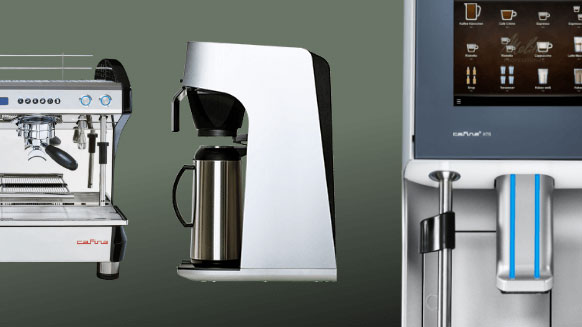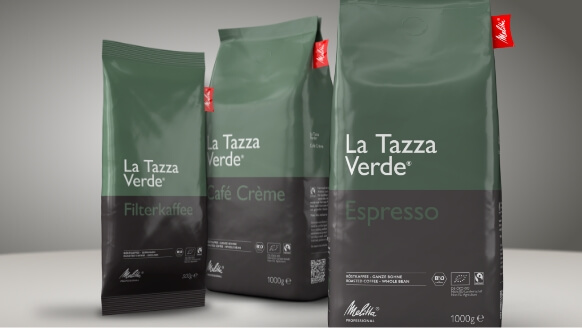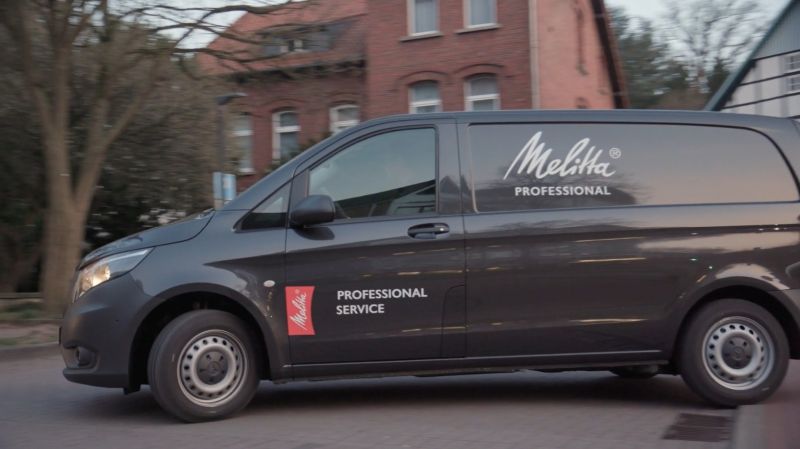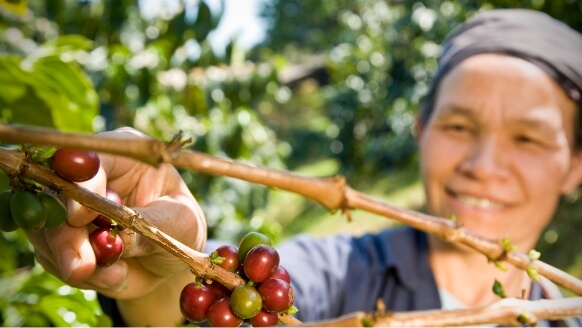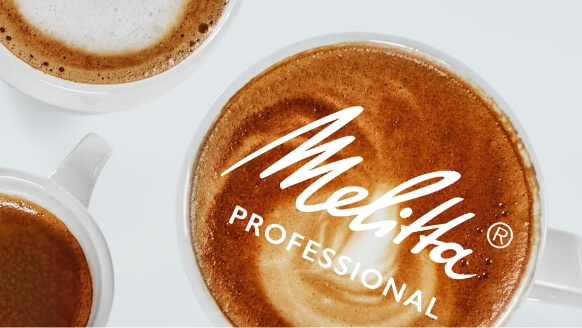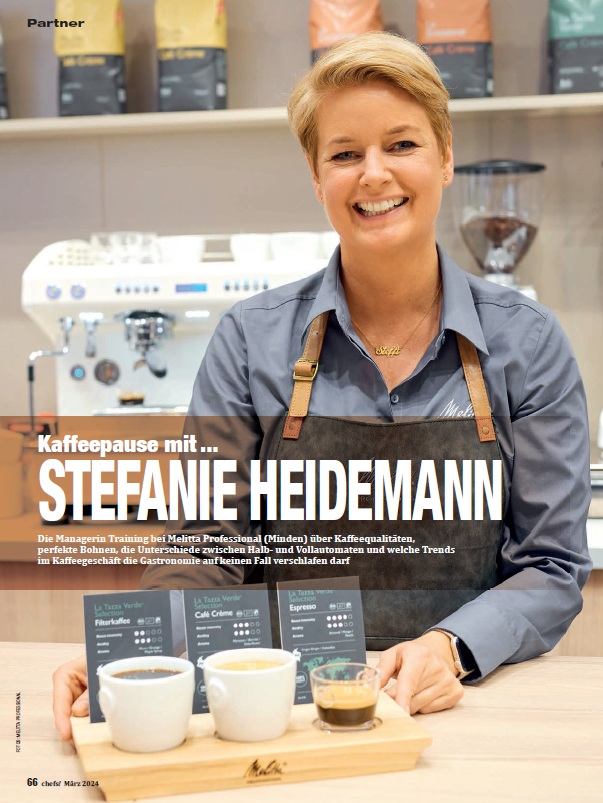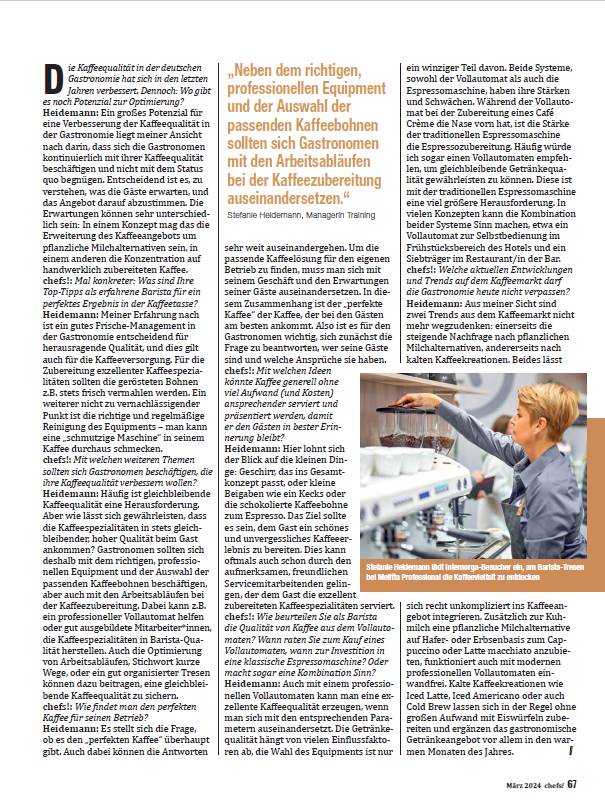chefs! - Coffee break with Stefanie Heidemann
Steffi Heidemann, Managerin Training bei Melitta Professional und internationale Jurorin der Specialty Coffee Association (SCA) talks about coffee qualities, perfect beans, the differences between semi-automatic and fully automatic machines and which trends in the coffee business the catering industry should not miss out on.
With the kind permission of the trade magazine chefs!, you can read the exciting interview with Steffi Heidemann, Training Manager at Melitta Professional and international judge of the Speciality Coffee Association (SCA), here.
chefs!: Coffee quality in the German catering industry has improved in recent years. Nevertheless, where is there still potential for optimisation?
Heidemann: In my opinion, there is great potential for improving coffee quality in the catering industry if restaurateurs continuously focus on their coffee quality and don't just settle for the status quo. It is crucial to understand what guests expect and to tailor the offer accordingly. Expectations can vary greatly: In one concept, this may be to expand the coffee offering to include plant-based milk alternatives, in another to focus on artisan coffee.
chefs!: Let's be more specific: As an experienced barista, what are your top tips for a perfect result in the coffee cup?
Heidemann: In my experience, good freshness management in the catering industry is crucial for outstanding quality, and this also applies to the coffee supply. To prepare excellent coffee specialities, for example, the roasted beans should always be freshly ground. Another point that should not be neglected is the correct and regular cleaning of the equipment - you can definitely taste a dirty machine in your coffee.
chefs!: What other issues should caterers who want to improve their coffee quality be concerned with?
Heidemann: Consistent coffee quality is often a challenge. But how can you ensure that the coffee specialities always reach the guest in a consistently high quality? Caterers should therefore consider the right professional equipment and the selection of suitable coffee beans, as well as the work processes involved in coffee preparation. For example, a professional fully automatic machine or well-trained employees who produce barista-quality coffee specialities can help. The optimisation of work processes, keyword short distances, or a well-organised counter can also help to ensure consistent coffee quality.
chefs!: How do you find the perfect coffee for your business?
Heidemann: The question arises as to whether the perfect coffee even exists. Here, too, the answers can vary widely. In order to find the right coffee solution for your own business, you have to analyse your business and the expectations of your guests. In this context, the "perfect coffee" is the coffee that is best received by guests. It is therefore important for restaurateurs to first answer the question of who their guests are and what their expectations are.
chefs!: What ideas could be used to serve and present coffee in a more appealing way without much effort (and cost) so that it remains in the guests' best memories?
Heidemann: It's worth looking at the little things here: crockery that fits in with the overall concept, or small additions such as a biscuit or chocolate-coated coffee bean with the espresso. The aim should be to provide guests with an enjoyable and unforgettable coffee experience. This can often be achieved by the attentive, friendly service staff who serve the guest the excellently prepared coffee specialities.
chefs!: As a barista, how would you rate the quality of coffee from a fully automatic machine? When would you recommend buying a fully automatic machine and when would you recommend investing in a classic espresso machine? Or does a combination even make sense?
Heidemann: You can also produce excellent coffee quality with a professional fully automatic machine if you familiarise yourself with the relevant parameters. The beverage quality depends on many influencing factors, the choice of equipment is only a tiny part of it. Both systems, the fully automatic machine and the espresso machine, have their strengths and weaknesses. While the fully automatic machine has the edge when it comes to preparing a café crème, the strength of the traditional espresso machine is the preparation of espresso. I would often even recommend a fully automatic machine in order to be able to guarantee consistent beverage quality. This is a much greater challenge with the traditional espresso machine. In many concepts, the combination of both systems can make sense, for example a fully automatic machine for self-service in the breakfast area of the hotel and a portafilter in the restaurant/bar.
chefs!: What current developments and trends in the coffee market should the catering industry not miss out on today?
Heidemann: In my opinion, there are two trends that the coffee market can no longer be imagined without: on the one hand, the increasing demand for plant-based milk alternatives and, on the other, cold coffee creations. Both can be easily integrated into the coffee range. Offering a plant-based milk alternative based on oats or peas in addition to cow's milk for a cappuccino or latte macchiato also works perfectly with modern professional fully automatic machines. Cold coffee creations such as iced latte, iced Americano or cold brew can usually be prepared with little effort using ice cubes and complement the catering beverage range, especially in the warmer months of the year.
